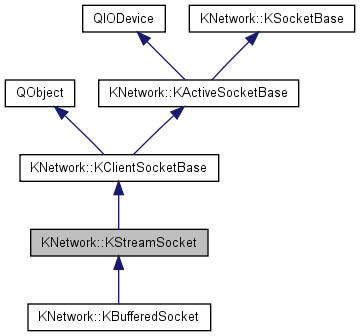KDECore
KNetwork::KStreamSocket Class Reference
Simple stream socket. More...
#include <kstreamsocket.h>

Signals | |
| void | timedOut () |
Public Member Functions | |
| virtual bool | bind (const KResolverEntry &entry) |
| virtual bool | bind (const QString &node=QString::null, const QString &service=QString::null) |
| virtual bool | connect (const KResolverEntry &entry) |
| virtual bool | connect (const QString &node=QString::null, const QString &service=QString::null) |
| KStreamSocket (const QString &node=QString::null, const QString &service=QString::null, QObject *parent=0L, const char *name=0L) | |
| int | remainingTimeout () const |
| void | setTimeout (int msecs) |
| int | timeout () const |
| virtual | ~KStreamSocket () |
Detailed Description
Simple stream socket.This class provides functionality to creating unbuffered, stream sockets. In the case of Internet (IP) sockets, this class creates and uses TCP/IP sockets.
Objects of this class start, by default, on non-blocking mode. Call setBlocking if you wish to change that.
KStreamSocket objects are thread-safe and can be used in auxiliary threads (i.e., not the thread in which the Qt event loop runs in). Note that KBufferedSocket cannot be used reliably in an auxiliary thread.
Sample usage:
QByteArray httpGet(const QString& hostname) { KStreamSocket socket(hostname, "http"); if (!socket.connect()) return QByteArray(); QByteArray data = socket.readAll(); return data; }
Here's another sample, showing asynchronous operation:
DataRetriever::DataRetriever(const QString& hostname, const QString& port) : socket(hostname, port) { // connect signals to our slots QObject::connect(&socket, SIGNAL(connected(const KResolverEntry&)), this, SLOT(slotSocketConnected())); QObject::connect(&socket, SIGNAL(gotError(int)), this, SLOT(slotSocketError(int))); QObject::connect(&socket, SIGNAL(readyRead()), this, SLOT(slotSocketReadyToRead())); QObject::connect(&socket, SIGNAL(readyWrite()), this, SLOT(slotSocketReadyToWrite())); // set non-blocking mode in order to work asynchronously socket.setBlocking(false); // turn on signal emission socket.enableRead(true); socket.enableWrite(true); // start connecting socket.connect(); }
Definition at line 97 of file kstreamsocket.h.
Constructor & Destructor Documentation
| KStreamSocket::KStreamSocket | ( | const QString & | node = QString::null, |
|
| const QString & | service = QString::null, |
|||
| QObject * | parent = 0L, |
|||
| const char * | name = 0L | |||
| ) |
Default constructor.
- Parameters:
-
node destination host service destination service to connect to parent the parent QObject object name name for this object
Definition at line 53 of file kstreamsocket.cpp.
| KStreamSocket::~KStreamSocket | ( | ) | [virtual] |
Member Function Documentation
| virtual bool KNetwork::KStreamSocket::bind | ( | const KResolverEntry & | entry | ) | [inline, virtual] |
Reimplemented from KClientSocketBase.
Connect this socket to this specific address.
Unlike bind(const QString&, const QString&) above, this function really does bind the socket. No lookup is performed. The bound signal will be emitted.
Reimplemented from KNetwork::KClientSocketBase.
Definition at line 175 of file kstreamsocket.h.
| bool KStreamSocket::bind | ( | const QString & | node = QString::null, |
|
| const QString & | service = QString::null | |||
| ) | [virtual] |
Binds this socket to the given nodename and service, or use the default ones if none are given.
In order to bind to a service and allow the operating system to choose the interface, set node to QString::null.
Reimplemented from KClientSocketBase.
Upon successful binding, the bound signal will be emitted. If an error is found, the gotError signal will be emitted.
- Note:
- Due to the internals of the name lookup and binding mechanism, some (if not most) implementations of this function do not actually bind the socket until the connection is requested (see connect). They only set the values for future reference.
- Parameters:
-
node the nodename service the service
Implements KNetwork::KClientSocketBase.
Definition at line 96 of file kstreamsocket.cpp.
| bool KStreamSocket::connect | ( | const KResolverEntry & | entry | ) | [virtual] |
Unshadowing from KClientSocketBase.
Reimplemented from KNetwork::KClientSocketBase.
Definition at line 192 of file kstreamsocket.cpp.
| bool KStreamSocket::connect | ( | const QString & | node = QString::null, |
|
| const QString & | service = QString::null | |||
| ) | [virtual] |
Reimplemented from KClientSocketBase.
Attempts to connect to the these hostname and service, or use the default ones if none are given. If a connection attempt is already in progress, check on its state and set the error status (NoError, meaning the connection is completed, or InProgress).
If the blocking mode for this object is on, this function will only return when all the resolved peer addresses have been tried or when a connection is established.
Upon successfully connecting, the connected signal will be emitted. If an error is found, the gotError signal will be emitted.
This function also implements timeout handling.
- Parameters:
-
node the remote node to connect to service the service on the remote node to connect to
Implements KNetwork::KClientSocketBase.
Definition at line 108 of file kstreamsocket.cpp.
| int KStreamSocket::remainingTimeout | ( | ) | const |
Retrieves the remaining timeout time (in milliseconds).
This value equals timeout() if there's no connection in progress.
Definition at line 78 of file kstreamsocket.cpp.
| void KStreamSocket::setTimeout | ( | int | msecs | ) |
Sets the timeout value.
Setting this value while a connection attempt is in progress will reset the timer.
Please note that the timeout value is valid for the connection attempt only. No other operations are timed against this value -- including the name lookup associated.
- Parameters:
-
msecs the timeout value in milliseconds
Definition at line 88 of file kstreamsocket.cpp.
| void KNetwork::KStreamSocket::timedOut | ( | ) | [signal] |
This signal is emitted when a connection timeout occurs.
| int KStreamSocket::timeout | ( | ) | const |
The documentation for this class was generated from the following files:
 KDE 3.5 API Reference
KDE 3.5 API Reference